THREE BUGS & THE TREE
I had to do some stuff in the city, early in the morning. That means that I spent some time in the forest park behind the last suburban houses when all the chores were done. It's my city ritual, I rarely skip it.
This time I was focused on the Tilia platyphyllos tree and the three hemipteran species I found among its foliage.
Here you can take a look at the tree that functions as some kind of backbone of the narrative structure in today's post. Everything revolves around that tree. In the following photograph ...

... you can take a better, more up-close look at its large ovate leaves.
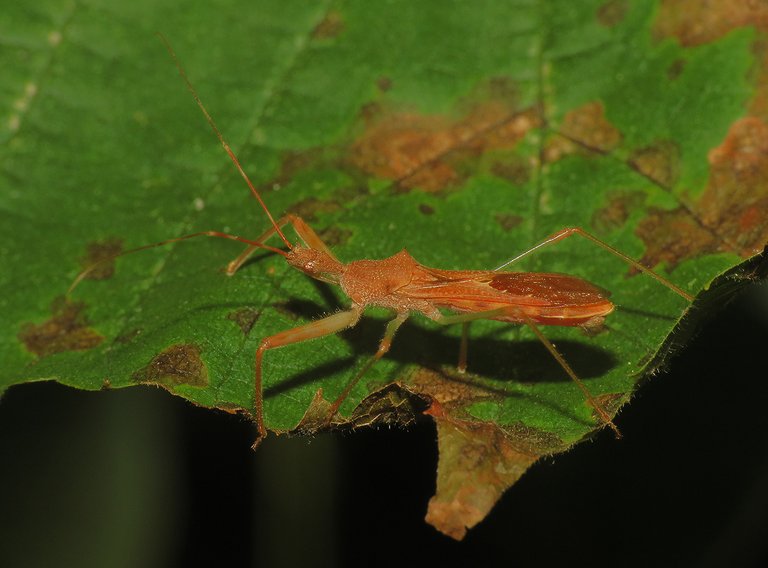
The first insect I decided to present is this long-legged predatory bug from the Reduviidae family.
The name of the species is Nagusta goedelii.
I never saw this bug before this summer.
The old and tall Pinus brutia pines dominate the part of the park close to the road that leads in and out of the city.
Compared to them Tilia platyphyllos it's a very small tree.
Dry needles that fall from the pines pave the forest floor and, as you can see in this photograph, decorate the smaller trees and shrubs.
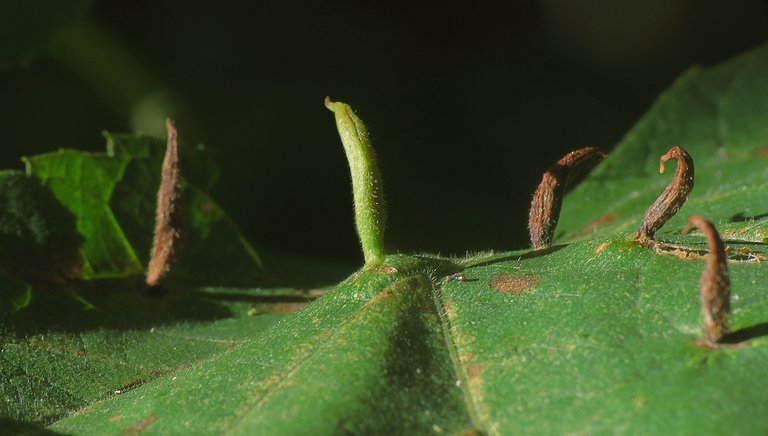
Here you can see another type of interesting "decoration" on the leaves of the Tilia platyphyllos tree.

These protuberances are a product of the mite activities. The name of the minuscule arachnid responsible for these creations is Eriophyes tiliae.
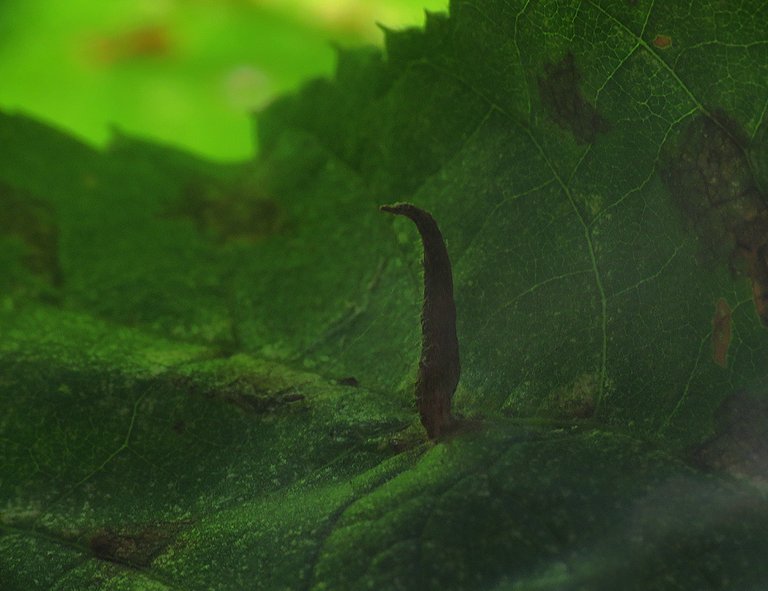
The chemicals the mite releases while sucking the sap induces the growth of this thing around the arachnid. It's like magically growing a house around the source of food. While I was photographing the mite galls ...
... a butterfly landed on the leaves a meter or two from me.
This is the Pararge aegeria, a species from the Satyrinae family.
The butterfly looks considerably different when photographed in different light.
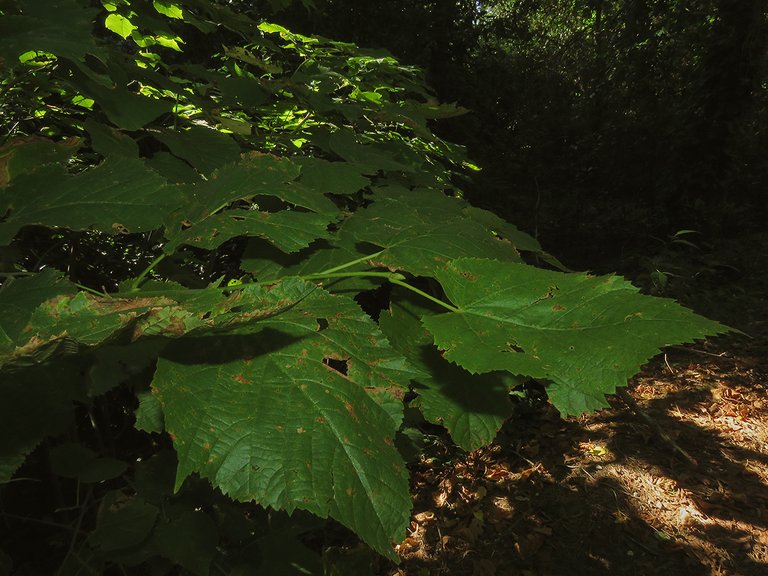
Here you can take a look at the leaves on the thin lowest branches that sprouted from the base of the trunk.
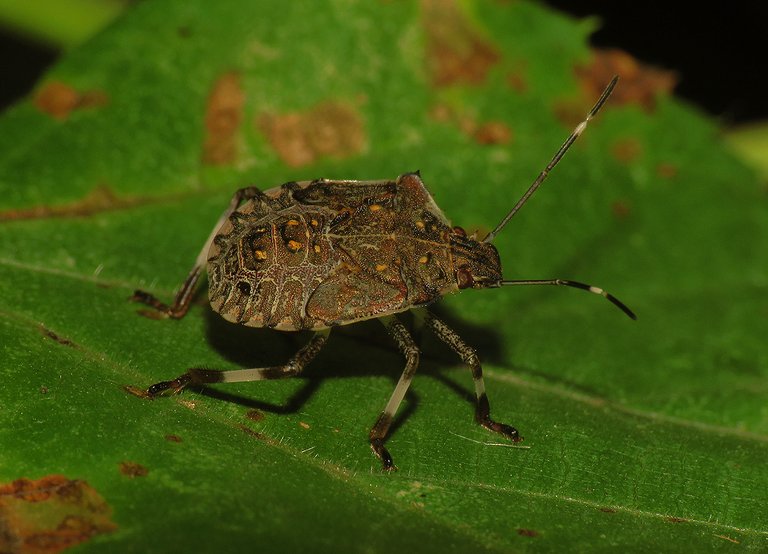
This is the second of the three bugs mentioned in the title, the Halyomorpha halys, commonly known as the brown marmorated stink bug. The Halyomorpha halys shown in this photograph is a wingless 5th instar nymph. After the next molting, this will be a winged adult. Both adults and nymphs feed on the sap of various plants.
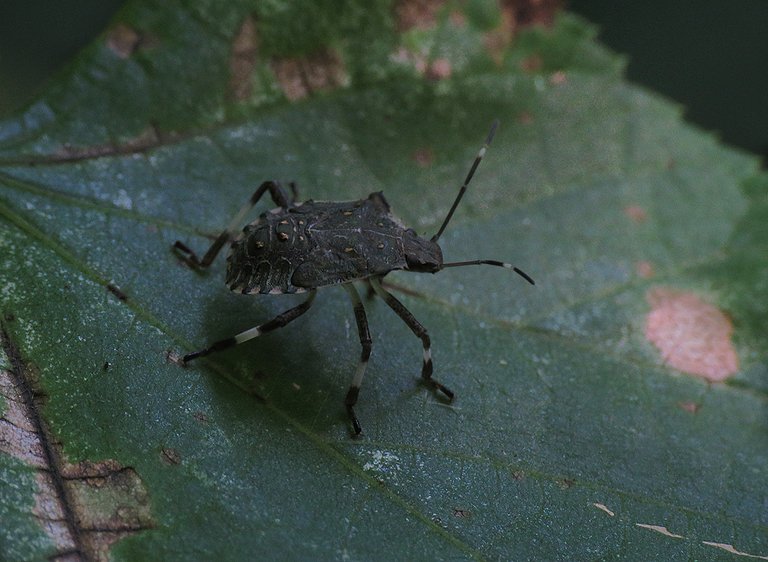
Here you can see the same insect photographed in ambient light. The brown marmorated stink bug belongs to the Pentatomidae family.
In this shot, you can take a look at the leaves of the branches about a meter or two above my head. The leaves, shown in the following photograph ...
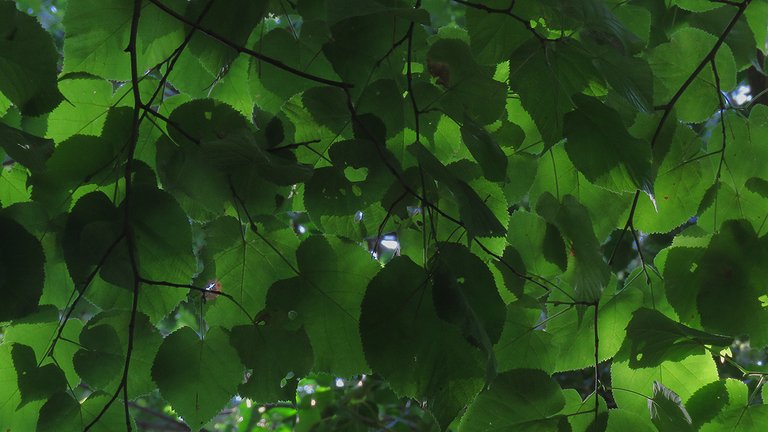
... were situated considerably higher.
I had to use the zoom of my camera to bring them closer to my eyes.

The third hemipteran species promised by the title was found and photographed among the different leaves of the same kind ...
... the brown leaves that have fallen from the Tilia platyphyllos tree.
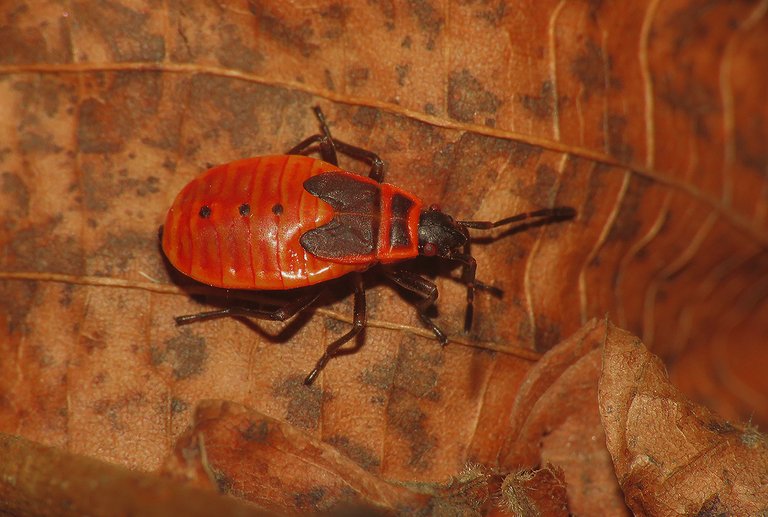
The name of this species from the Pyrrhocoridae family is Pyrrhocoris apterus. Here you can see a 5th instar nymph ready to become an adult. In the following photograph ...
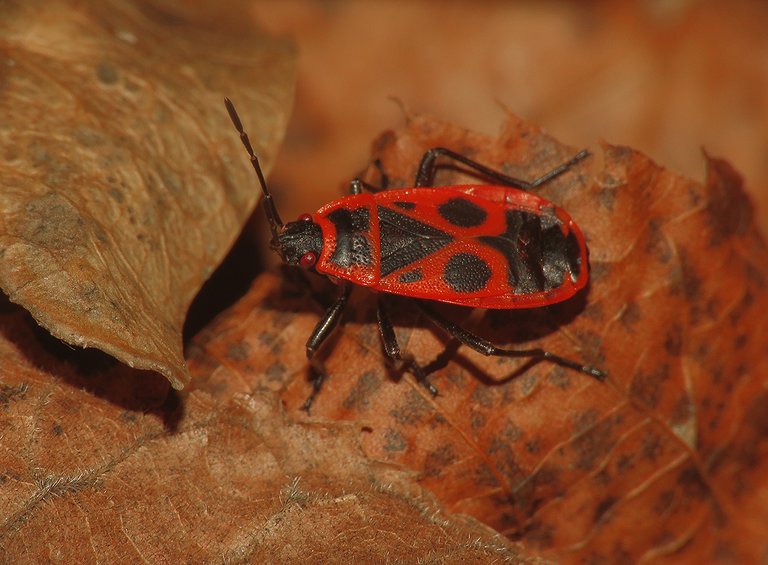
... you can see an adult. The diet of these bugs consists primarily of seeds from lime trees (various Tilia species) and mallow seeds but they can also be seen feeding on the carcasses of other insects.
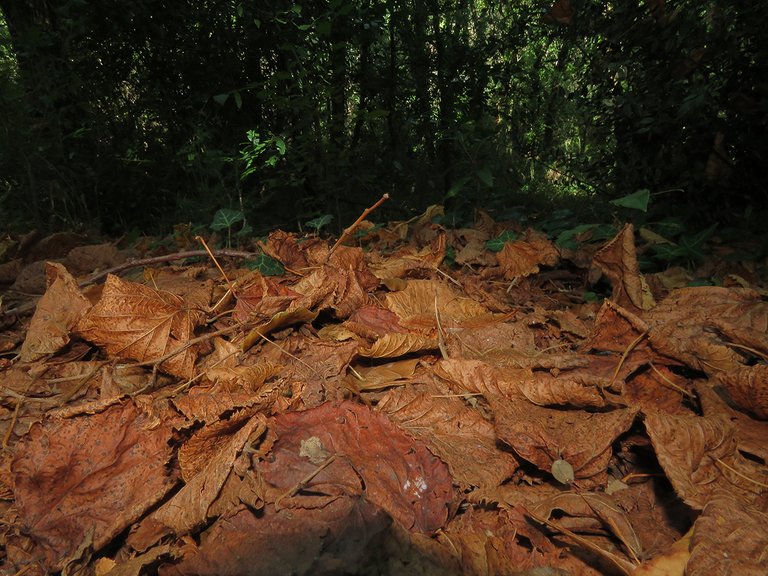
The leaf litter on the ground around the trunk of the Tilia platyphyllos tree provides plenty of food and shelter for large groups of Pyrrhocoris apterus bugs.
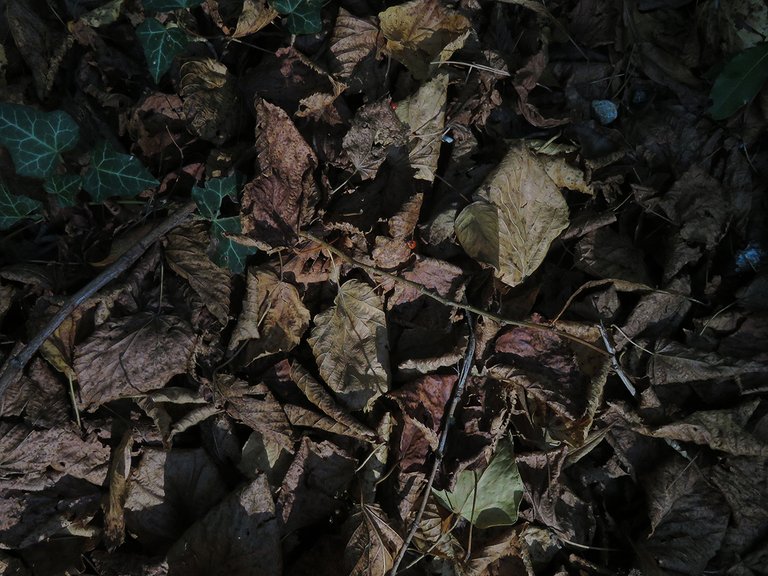
The tiny red dot in the center of this shot is a Pyrrhocoris apterus nymph.
Here you can see two small nymphs on the green surface of the ivy leaf.
In this last shot, especially if you enlarge the picture by clicking on it, you can count five Pyrrhocoris apterus nymphs among the fallen leaves.
The following links will take you to the sites with more information about the protagonists of this post. I found some stuff about them there.
https://en.wikipedia.org/wiki/Tilia_platyphyllos
https://en.wikipedia.org/wiki/Nagusta_goedelii
https://en.wikipedia.org/wiki/Eriophyes_tiliae
https://en.wikipedia.org/wiki/Speckled_wood_(butterfly)
https://en.wikipedia.org/wiki/Brown_marmorated_stink_bug
https://en.wikipedia.org/wiki/Pyrrhocoris_apterus
AND THAT'S IT. AS ALWAYS HERE ON HIVE, THE PHOTOGRAPHS ARE MY WORK.


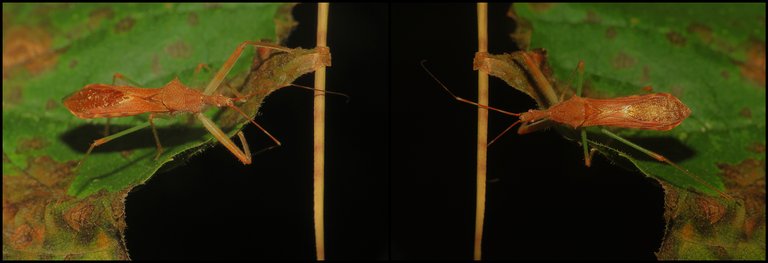
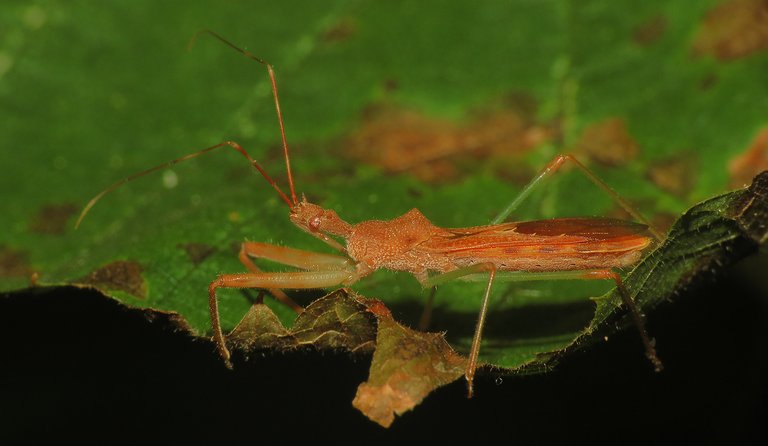
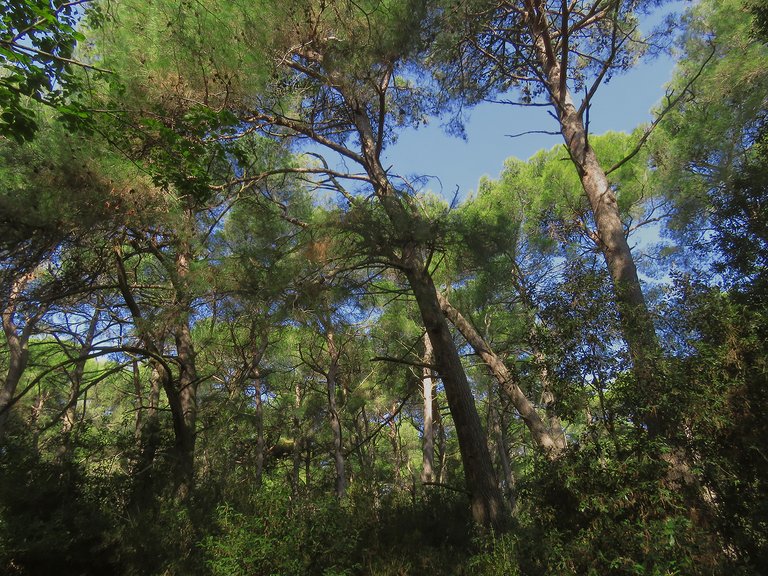
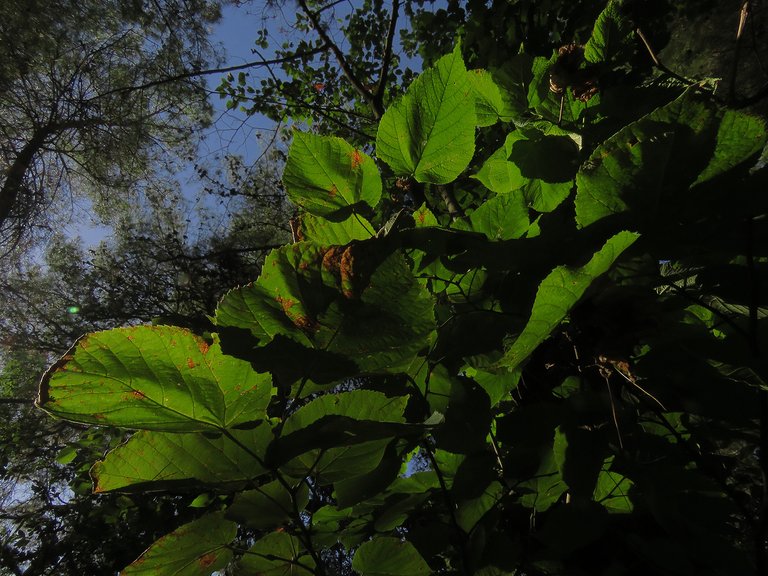


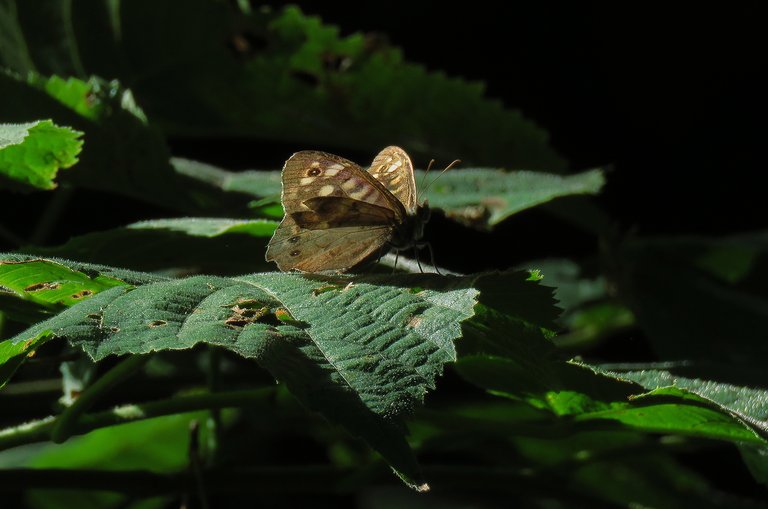
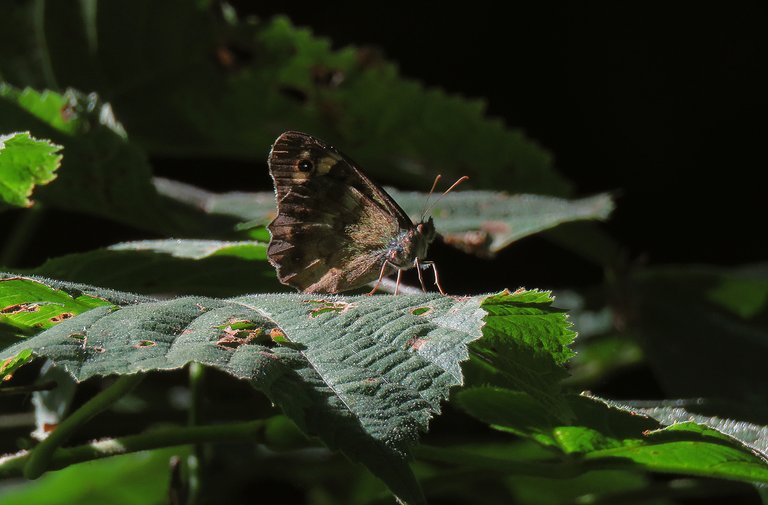


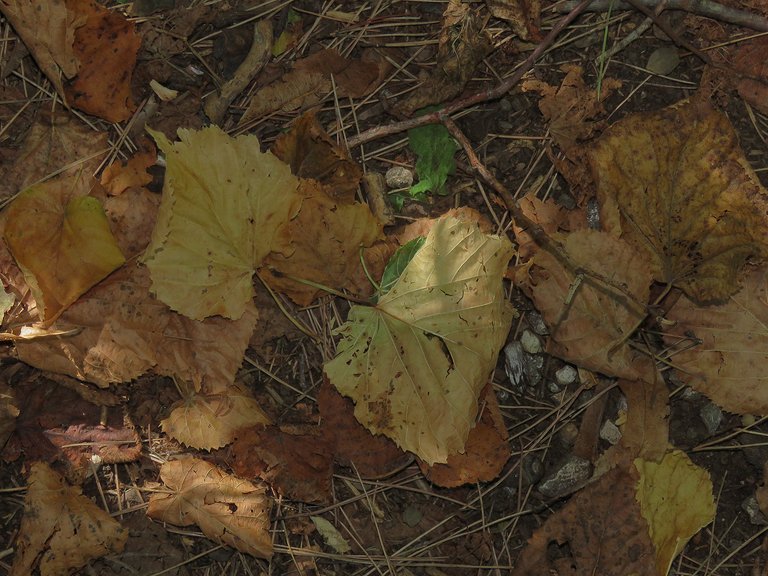
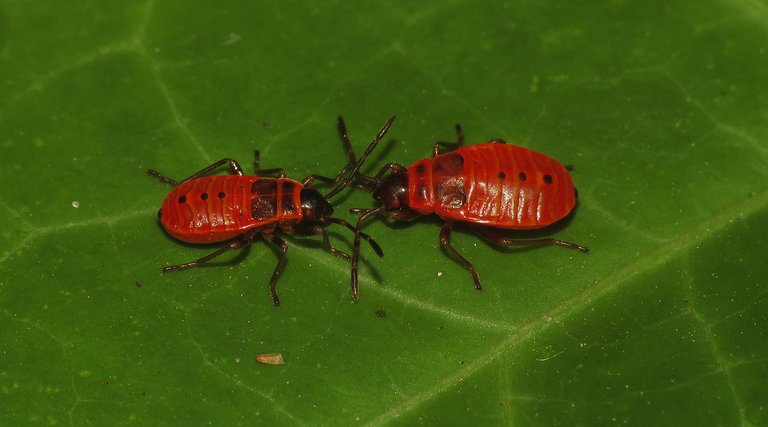
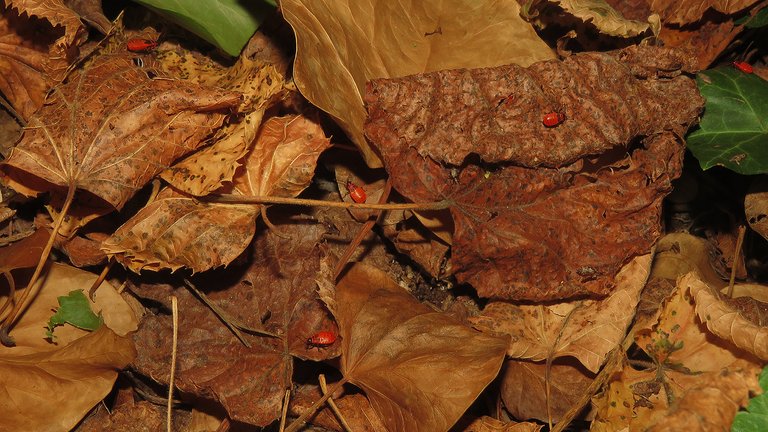
nice that you found those tree bugh while going in the city. love how you capture the foliage of the tree from below, looks surreal.
!DHEDGE !PIZZA
$PIZZA slices delivered:
@ekavieka(1/5) tipped @borjan
This post has been selected for upvote from our token accounts by @ekavieka! Based on your tags you received upvotes from the following account(s):
- @dhedge.bonus
- @dhedge.pob
- @dhedge.stem
@ekavieka has 5 vote calls left today.
Hold 10 or more DHEDGE to unlock daily dividends and gain access to upvote rounds on your posts from @dhedge. Hold 100 or more DHEDGE to unlock thread votes. Calling in our curation accounts currently has a minimum holding requirement of 100 DHEDGE. The more DHEDGE you hold, the higher upvote you can call in. Buy DHEDGE on Tribaldex or earn some daily by joining one of our many delegation pools at app.dhedge.cc.
Good work bro, much appreciated
Lovely. Looks like autumn is coming there?
The calendar says not only that the autumn is near, but it has officially started. It still feels like summer though. I just can't imagine the winter coming this year, it's so warm, even hot around noon right now.
When light rays falls on leaves, its shady reflection is very beautiful. Details are shown in clear manner.
True. 🙂 The light can do magic.
Those leaves are unique. I have never seen such decoration over tree leaves. Threes and bugs you captured are worth-seeing. I would never know their names and family!
Nice photos as always. It seems like those two small nymphs are discussing something that matters, lol.
Good observation. It definitely looks like an important meeting. 😀
Bugs are seems very interesting creaping on that place looking nice, other oictyres of trees and the butterfly looks great. great stuff to develoo more fascinating sound for viewers to catch their attention.
i liked the way you explain ing about these creatures.
Oh, I like this! Such nice insects, I think I'll try to paint a scarab!
Cool. 🙂Looking forward to seeing a beetle painted in your style.
Back then, I used to haunt insects on my plants. However, I can't capture pictures as beautiful as you do. 😆
!LUV
You'll get better with practice.🙂
Thank you for your witness vote!
Have a !BEER on me!
To Opt-Out of my witness beer program just comment STOP below
View or trade
BEER.Hey @shula14, here is a little bit of
BEERfrom @isnochys for you. Enjoy it!Do you want to win SOME BEER together with your friends and draw the
BEERKING.I always love the way you take these photos and details every one of it.
Your knowledge on insects is remarkable. How do you begin with identification? ..or is most of it now in your head? Stink bugs are so cute - buuuut they do stink lol. Great post mate.
I began being interested in identification when I started blogging here on Hive. Many species are easy to find on the Internet. Others are more challenging. Most of the time I find what I'm looking for but sometimes it takes hours.
I'm guess now.. but one could probably find a cool 'field guide' book perhaps on a whole bunch of 'em. With your existing expertise, you'd probs be able to quickly narrow them down by flicking through the pages. I dunno.. an idea perhaps, though you seem to have a pretty awesome rhythm at the moment anyway.
El insecto depredador de patas largas es muy extraño, pero hermoso.
Las 2 ninfas rojo/negro parecen disfrutar el día en la hoja..
Realmente el trabajo que haces con la naturaleza y los insectos es muy apreciado por mí y mi familia, continuamos buscando la lente macro para empezar a trabajar nosotros también, que continúe cosechando éxitos en esta prestigiosa cadena de bloques amigo @borjan.
You can safely lead excursions to your trees, but you need to find a contingent of insect lovers in your city :)
!ALIVE
@borjan! You Are Alive so I just staked 0.1 $ALIVE to your account on behalf of @ peter-stone. (1/10)
The tip has been paid for by the We Are Alive Tribe through the earnings on @alive.chat, feel free to swing by our daily chat any time you want, plus you can win Hive Power (2x 50 HP) and Alive Power (2x 500 AP) delegations (4 weeks), and Ecency Points (4x 50 EP), in our chat every day.

😃
And I really love this leaves. It is looking fresh. Also the photograph was really top notch
https://twitter.com/LovingGirlHive/status/1709883492270846276
The decorative shapes on the leaves look very beautiful and very unique
You have very sharp eyesight, dear friend @borjan, to be able to find these small insects in the foliage of the tree.
Beautiful varieties of insects you have found, I appreciate that you let us know about this find
Have a wonderful day
Thank you. 🙂 Have a great day.
I believe spending just a little time with Nature gives wonderful rewards to our general health in all kinds of different ways! So your daily Nature visits to photograph insects and trees is a great inspiration to us all I think!
Have a nice day Borjan, and awesome bug shots Today !VSC !LOLZ 😊
@fun.farms has sent VSC to @borjan
This post was rewarded with 0.1 VSC to support your work.
Join our photography communityVisual Shots
Check here to view or trade VSC Tokens
Be part of our Curation Trail
@fun.farms ha enviado VSC a @borjan
Éste post fue recompensado con 0.1 VSC para apoyar tu trabajo.
Únete a nuestra comunidad de fotografía Visual Shots
Consulte aquí para ver o intercambiar VSC Tokens
Se parte de nuestro Trail de Curación
lolztoken.com
But that’s a whisk I’m willing to take.
Credit: reddit
@borjan, I sent you an $LOLZ on behalf of fun.farms
(1/10)
NEW: Join LOLZ's Daily Earn and Burn Contest and win $LOLZ
https://twitter.com/lee19389/status/1709907663377588706
#hive #posh
It's nice that you found the bugs
They look amazing
Nice pictures!
The pictures of dry leaf is cool too
Congratulations, your post has been upvoted by @dsc-r2cornell, which is the curating account for @R2cornell's Discord Community.
This ovate tree leaves looks breathtaking 😍
Thanks for sharing
hermosa foto
La naturaleza es simplemente increíble, debajo de cada roca o árbol caído podemos encontrar un mundo nuevo de pequeñas criaturas.
By going to the forest, such beautiful insects are seen by humans a lot. The special thing is that when you take pictures of them, they are very clear and beautiful. It is very good to see and our knowledge. I also increase a lot.
Outstanding pictures that capture every detail of the insects and the woods they dwell in.
The picture of the Pyrrhocoris apterus and the markings are so remarkably symmetrical that they look as though they have been painted on the bug's back.
@borjan thanks again for that link to that macro lens. I just got it yesterday and can't wait to start fooling around with it. Any suggestions on how to use it on my
initial try.
🙂
The perfect shot, insects always have a uniqueness that makes us interested in seeing them
@tipu curate 🌻
Upvoted 👌 (Mana: 65/75) Liquid rewards.
its my first time see them
Amazing what we can see when we pause to look closer. I have started to do that a little more and find myself wondering what species some of the plants and insects are. I usually take one of my pictures and google it. Amazing how it comes back with good links to each so I can learn an pass that on like you have here.
An appreciation for these tiny little things among us surely connects us to our world a little better.
Nicely done !
Yes, 🙂 most of the time, it is easy to find the name of the species or at least the family or larger group through the Internet. I also do it that way when I'm writing the posts, and I'm learning a lot along the way. Some species I regularly encounter have remained in my mind so I don't have to search again.
This is a very lovely picture; the way the leaves' shadows are falling makes it even more beautiful.
Thank you. Glad you lie the post.